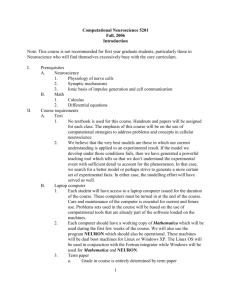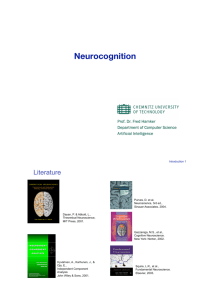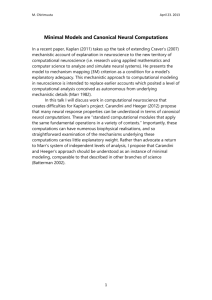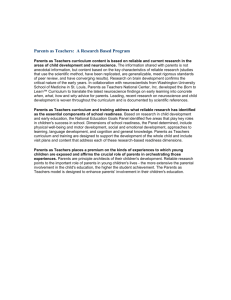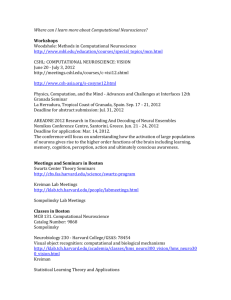Fundamentals of Computational Neuroscience GMS 6719 Lectures
advertisement
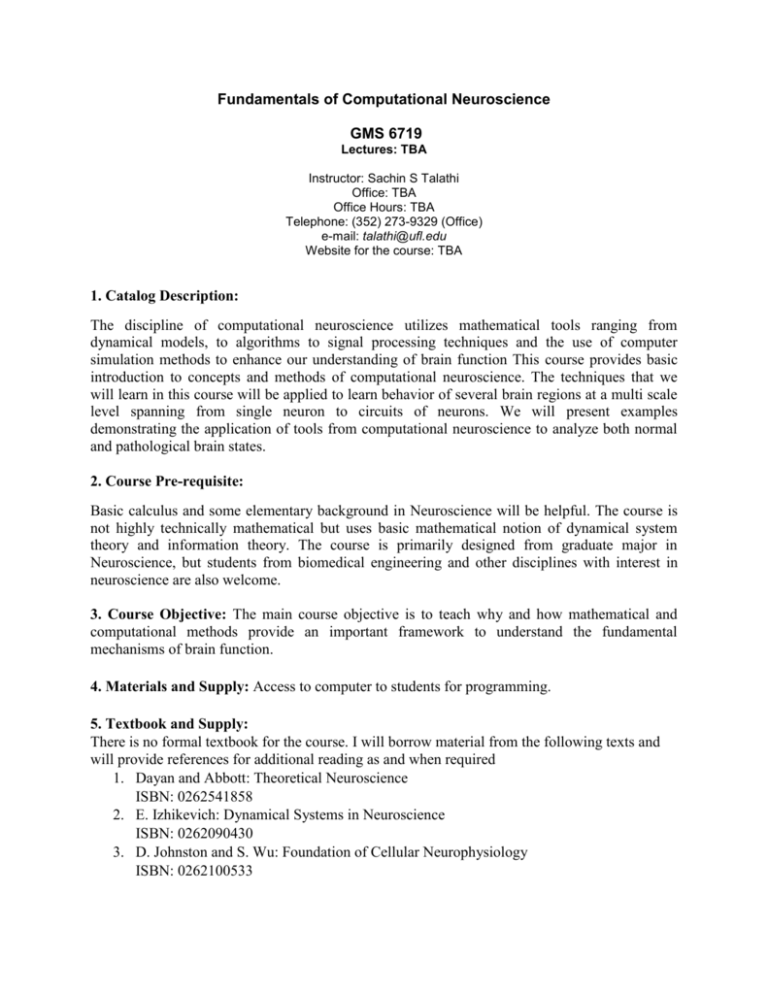
Fundamentals of Computational Neuroscience GMS 6719 Lectures: TBA Instructor: Sachin S Talathi Office: TBA Office Hours: TBA Telephone: (352) 273-9329 (Office) e-mail: talathi@ufl.edu Website for the course: TBA 1. Catalog Description: The discipline of computational neuroscience utilizes mathematical tools ranging from dynamical models, to algorithms to signal processing techniques and the use of computer simulation methods to enhance our understanding of brain function This course provides basic introduction to concepts and methods of computational neuroscience. The techniques that we will learn in this course will be applied to learn behavior of several brain regions at a multi scale level spanning from single neuron to circuits of neurons. We will present examples demonstrating the application of tools from computational neuroscience to analyze both normal and pathological brain states. 2. Course Pre-requisite: Basic calculus and some elementary background in Neuroscience will be helpful. The course is not highly technically mathematical but uses basic mathematical notion of dynamical system theory and information theory. The course is primarily designed from graduate major in Neuroscience, but students from biomedical engineering and other disciplines with interest in neuroscience are also welcome. 3. Course Objective: The main course objective is to teach why and how mathematical and computational methods provide an important framework to understand the fundamental mechanisms of brain function. 4. Materials and Supply: Access to computer to students for programming. 5. Textbook and Supply: There is no formal textbook for the course. I will borrow material from the following texts and will provide references for additional reading as and when required 1. Dayan and Abbott: Theoretical Neuroscience ISBN: 0262541858 2. E. Izhikevich: Dynamical Systems in Neuroscience ISBN: 0262090430 3. D. Johnston and S. Wu: Foundation of Cellular Neurophysiology ISBN: 0262100533 6. Course Outline: Detail by topics per week (Tentative) Week One: Course overview and review of basics Week Two: Single cell models Week Three: Single cell models: Morphology Week Four: Introduction to computer models for single cells and neural dynamics Week Five: Single neuron computational properties Week Six: Neural communication and neural networks Week Seven: The neural code Week Eight: Plasticity and learning Week Nine: Classical conditioning, reinforcement learning and reward Week Ten: Data collection modalities in Neuroscience 7. Attendance and Expectations: Attendance is not compulsory. Expectations: Interest and willingness to learn. Basic class etiquette such as no cell-phones etc… 8. Grading: There will be around 4-6 homework assignments throughout the course. Students are free to work individually or in groups; however, each student must individually turn in their own homework, which is not simply a copy of another student’s work. Homework will form 40% of the grade for the class. The remainder 60% of the grades will be based on a group project and one hour final examination. Written report of group project will be pre-requirement for taking the final examination. Project: There will be final project, which is worth 40% of the credit for the class. You may either work individually or in groups of 2-3. The only requisite for the project is that it should involve some aspects of computational neuroscience in it. 17. Grading scale: Curved 18. Make-Up Exam Policy: There is no make up exam 19. Honesty Policy: All students admitted to the University of Florida have signed a statement of academic honesty committing themselves to be honest in all academic work and understanding that failure to comply with this commitment will result in disciplinary action. This statement is a reminder to uphold your obligation as a UF student and to be honest in all work submitted and exams taken in this course and all others. 20. Accommodation for Students with Disabilities: Students requesting classroom accommodation must first register with the Dean of Students Office. That office will provide the student with documentation that he/she must provide to the course instructor when requesting accommodation. 21. UF Counseling Services: Resources are available on-campus for students having personal problems or lacking clear career and academic goals. The resources include: University Counseling Center, 301 Peabody Hall, 392-1575, Personal and Career Counseling. SHCC mental Health, Student Health Care Center, 392-1171, Personal and Counseling. Center for Sexual Assault/Abuse Recovery and Education (CARE), Student Health Care Center, 392-1161, sexual assault counseling. Career Resource Center, Reitz Union, 392-1601, career development assistance and counseling. 22. Software Use: All faculty, staff and student of the University are required and expected to obey the laws and legal agreements governing software use. Failure to do so can lead to monetary damages and/or criminal penalties for the individual violator. Because such violations are also against University policies and rules, disciplinary action will be taken as appropriate. We, the members of the University of Florida community, pledge to uphold ourselves and our peers to the highest standards of honesty and integrity.
